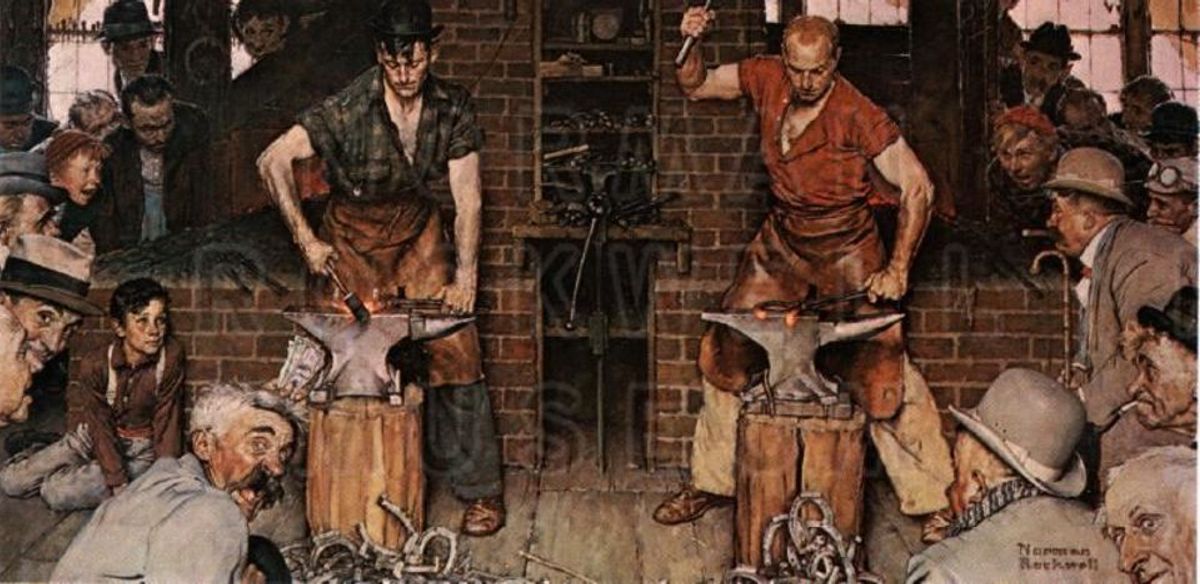On Monday, 30 October, the Attorney General of the Commonwealth of Massachusetts, Maura Healey, supported a motion for a temporary restraining order to block the Berkshire Museum from selling 40 works of art from its collection to shore up its finances and fund a “New Vision” renovation. This includes two Norman Rockwell oil paintings that the artist donated to the museum, due to be sold at Sotheby’s 13 November American Art sale in New York. A Superior Court judge will decide whether to grant the temporary restraining order on Wednesday, 1 November.
In its response to the court, the Attorney General’s Office (AGO) said it needs more time to investigate into whether there are legal restrictions that would prohibit the sale, and if the sale would need court review, due to the “radical way” that the deaccessioning and “New Vision” would change the museum.
“We respectfully disagree there is any further inquiry for the Attorney General to conduct before these long-scheduled sales can proceed,” said William F. Lee of WilmerHale, which is representing the Berkshire Museum, in a statement. “For more than four months, the museum has cooperated fully in providing documents and information to the Attorney General’s Office.”
When the museum made its decision in July to deaccession 40 works of art in its collection—including pieces by Alexander Calder and Frederic Church—it had to notify the AGO of its intent to sell the works. But, “the museum did not present all relative facts to the AGO when it sent its notice,” the response says. “A number of important facts have only come to light through multiple inquiries and research.” For example, some documents the AGO requested on 18 August were not turned over by the museum until 24 October, four days after the motion for the temporary restraining order was filed, according to the response.
These recent submissions include historical documents that suggest that the museum does not have the right to sell works of art outside of the city of Pittsfield, that were acquired before 1932, when the museum was incorporated as a separate entity from the Berkshire Athanaeum and Museum, founded in 1871. The act to incorporate the museum “did not remove the restriction on gifts the Athanaeum had acquired prior to 1932”—which account for 19 of the 40 items to be sold—the response says.
Among the other reasons in support of a temporary restraining order is the correspondence between the museum and Norman Rockwell, which “suggests that the Museum understood at the time Rockwell donated the art that the pieces were his favorite oil paintings and that he gifted them to the museum so that they would remain on view in the Berkshires”.
The AGO also challenges the museum’s argument that it will be able to show more of its art collection—around 5,000 works, in a collection of 40,000 total objects—since its “New Vision” plan would integrate art with history and science displays, as well as the claim that it will keep most of its art collection intact. “The Museum’s argument mistakenly equates the quantity of art it owns with the significance and value of that art,” the response reads.
While recognising that “bold visions can be essential to implementing charitable purposes in the long term” and supporting “creative and proactive leadership in charitable organizations,” the AGO says it has a “duty to ensure that charities further their purposes in a manner that abides by any restrictions on assets they hold, and that charitable organization leaders and fiduciaries exercise due care in coming to major decisions.”
“We respect the role of the Attorney General in this process, but continue to believe we have strong legal grounds to move forward and secure the future of the Berkshire Museum as an invaluable asset to the educational, cultural and economic life of our community,” the president of the museum’s board of trustees, Elizabeth McGraw, says in a statement. “We have made clear that the Board of Trustees acted consistent with its mission and the founding principles of this museum and our fiduciary responsibility. Our plan is to proceed, but these are now issues for the court to decide.”
“Although the decision is ultimately one the Superior Court will make, we are pleased that the Attorney General has concluded, as we have contended, that it is in the public interest that the sale of these paintings not occur at this time,” said Michael Keating of Foley Hoag LLP, who is representing the plaintiffs including Normal Rockwell’s sons, in an email.
Meanwhile, Sotheby’s says in a statement that it is “fully committed to the Museum’s success and, unless a court rules otherwise, will proceed with the auctions beginning on 13 November”.


